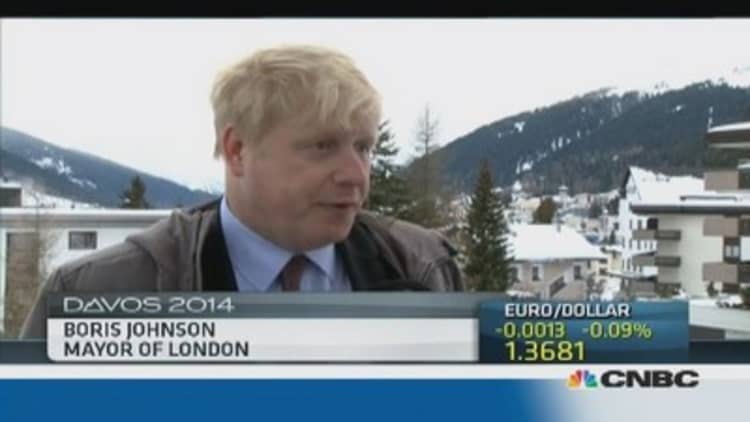Britain's opposition Labour Party promised on Saturday to balance the government's books and deliver a budget surplus in the next parliament if it won the 2015 election, aided by reintroducing higher tax rates for the nation's top earners.
Ed Balls, Labour's would-be finance minister, made a binding commitment to clear the deficit of nearly 80 billion pounds ($132 billion) and deliver a surplus in his budgets, and to put national debt on a downward path by 2020.
Balls, who is under pressure to improve his party's economic credibility, said one way Labour would help to achieve this was by reintroducing a top tax rate of 50 pence in the pound for anyone earning 150,000 pounds or more a year.
(Read more: BoE keeps an eye on forward guidance: Carney)
"The next Labour government will balance the books and deliver a surplus on the current budget and falling national debt in the next parliament," Balls said in a speech to the Fabian Society in central London on Saturday.
"Reversing this unfair tax cut for the richest 1 percent of people in the country is necessary so we can cut the deficit in a fair way in the next parliament."
The last Labour government raised the upper tax rate to 50 percent from 40 percent in 2010 but the Conservative-led coalition government cut this to 45 percent in 2013, arguing it was the highest in the G20 and hurt Britain's competitiveness.
But Balls said figures showed people paid almost 10 billion pounds more in tax in the three years when the 50 pence top rate was in place.
Deficit and debt targets
Labour leads the ruling Conservatives in opinion polls but the public consistently says it trusts Prime Minister David Cameron's Conservatives more on the economy, a verdict the left-leaning party is struggling to reverse at a time when economists are predicting Britain's economic recovery will pick up pace.
(Read more: Gloves off: Summers vs. Osborne)
Cameron repeatedly reminds voters that the last 1997-2010 Labour government left Britain with a budget deficit equivalent to 11 percent of gross domestic product, the country's biggest peacetime deficit. In March 2013 it was 7.3 percent of GDP.
Labour says its plans were blown off course by the 2007/8 global financial crisis and it can deliver "iron discipline" if re-elected with a credible commitment to eliminate the deficit.

"But without action to deliver investment-led growth and fairer choices about how to get the national debt down while protecting vital public services, then fiscal discipline cannot be delivered by a Labour government or, in my view, by any government," Balls said.
The Confederation of British Industry (CBI) said it was essential to cut the deficit and national debt but this needed to be accompanied by pro-business, pro-growth policies and criticised Balls' plan to reintroduce higher tax rates.
"This puts talented people off coming to the UK to invest and create jobs," said CBI Chief Policy Director Katja Hall.
Balls' intention of tackling the deficit in the government's current account, which includes spending on things such as welfare and public services, is less aggressive than a plan by finance minister George Osborne.
Osborne has pledged to run an absolute surplus and wants to wipe out the deficit in overall government spending, including investment spending. In his recent autumn statement, Osborne said he expected the UK to run a budget surplus by 2018-19.
Labour is committed to running a current budget surplus by the end of the next parliament in 2020 and has made increased investment spending a core part of its economics policies, vowing to build more homes and infrastructure.
Balls said Labour would abolish the "discredited idea" of rolling five-year fiscal targets and push for "tough fiscal rules" within 12 months of the election in May 2015.
He also said a Labour government would use the proceeds from the sale of the state's stakes in Lloyds and RBS banks to help repay the national debt.
Follow us on Twitter: @CNBCWorld


